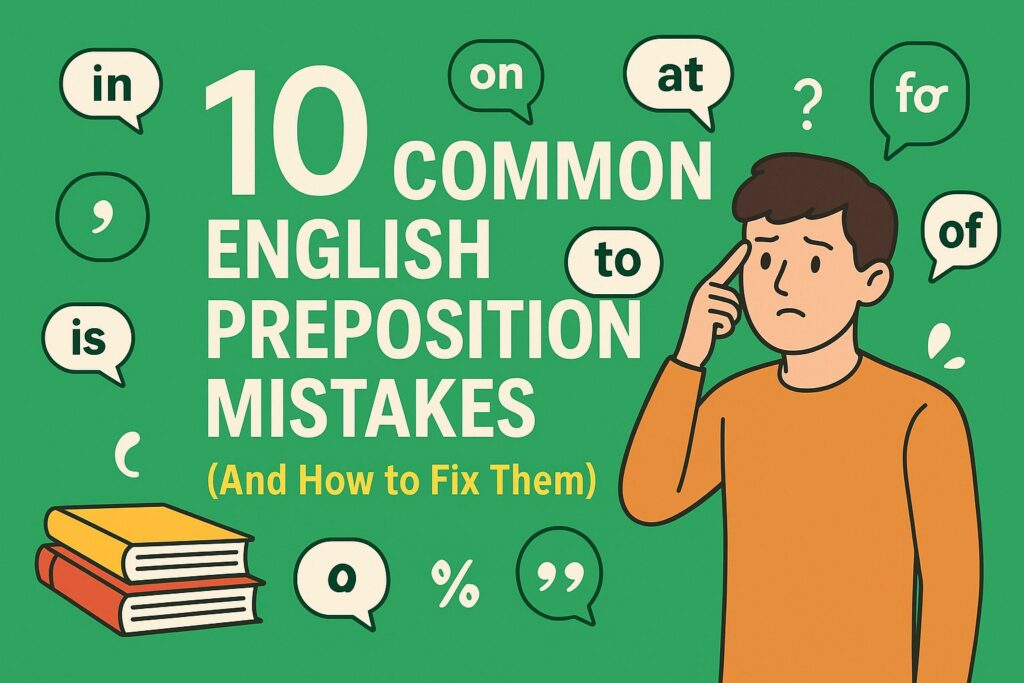what are prepositions?
Prepositions are small words like in, on, at, to, for, of, but they can be very tricky and Common English preposition mistakes are a big problem for learners at all levels. Using the wrong preposition can confuse the meaning of your sentence or make it sound unnatural. In this article, you’ll learn how to fix the 10 most common preposition mistakes in English, with clear rules and simple examples on preposition mistakes.
1. Incorrect: “I’m good in English.”
Correct: “I’m good at English.”
Many learners say “good in English,” but the correct phrase is good at when talking about skills.
♤ Wrong: I’m good in math.
♤ Right: I’m good at math.
Tip: Use “good at” to talk about ability or skill in a subject or activity.
2. Incorrect: “She depends from her parents.”
Correct: “She depends on her parents.”
“Depend” always goes with the preposition on.
♤ Wrong: He depends from his job.
♤ Right: He depends on his job.
Tip: Always say “depend on” when talking about relying on someone or something.
3. Incorrect: “I am married with a teacher.”
Correct: “I am married to a teacher.”
When you talk about who someone is married to, use to, not with.
♤ Wrong: She is married with a doctor.
♤ Right: She is married to a doctor.
Tip: Use “married to” for people and “married with” only if you are talking about kids (e.g., married with two children).
4. Incorrect: “We discussed about the plan.”
Correct: “We discussed the plan.”
Some verbs like discuss, enter, reach, consider do not need a preposition.
♤ Wrong: We discussed about our trip.
♤ Right: We discussed our trip.
📝 Tip: Don’t use about after “discuss.” Just say the object directly.
5. Incorrect: “He is afraid from dogs.”
Correct: “He is afraid of dogs.”
The correct preposition after “afraid” is of.
♤ Wrong: I am afraid from the dark.
♤ Right: I am afraid of the dark.
Tip: Say “afraid of” when something scares you.
6. Incorrect: “She is interested for music.”
Correct: “She is interested in music.”
We use interested in, not “for.”
♤ Wrong: He is interested for history.
♤ Right: He is interested in history.
Tip: Use “interested in” when talking about what someone likes or enjoys.
7. Incorrect: “I listened the teacher.”
Correct: “I listened to the teacher.”
We say listen to someone or something.
♤ Wrong: Listen me!
♤ Right: Listen to me!
Tip: Always include “to” after listen.
8. Incorrect: “She is angry to me.”
Correct: “She is angry with me.”
The correct preposition is with, not to.
♤ Wrong: He’s angry to his friend.
♤ Right: He’s angry with his friend.
Tip: Use “angry with” someone and “angry about” something.
9. Incorrect: “I arrived to the airport.”
Correct: “I arrived at the airport.”
With arrive, use at (for specific places) and in (for countries or cities).
♤ Wrong: They arrived to school late.
♤ Right: They arrived at school late.
Tip:
• Use arrive at = for small places (school, airport, station)
• Use arrive in = for large places (a city, a country)
10. Incorrect: “I’m looking forward to meet you.”
Correct: “I’m looking forward to meeting you.”
After “looking forward to,” use a verb+ing, not the base form.
♤ Wrong: I look forward to see you.
♤ Right: I look forward to seeing you.
Tip: “To” is part of the phrase, not an infinitive. Use the -ing form of the verb.
Common Preposition Collocations You Should Learn
Here are some more useful preposition collocations that you should remember:
| Verb / adjective | correct preposition | Example Sentence |
| interested | in | I’m interested in learning English. |
| good | at | he’s good at drawing. |
| tired | of | I’m tired of waiting. |
| believe | in | do you believe in your self? |
| famous | for | Paris is famous of its food. |
| pay | for | she is paid for the meal. |
| laugh | at | they laughed at the joke. |
| apply | for | I applied for a new job. |
| afraid | of | she’s afraid of snakes. |
| agree | with | I agree with your opinion. |
Tips to Avoid Preposition Mistakes
- Learn phrases, not just words.
Example: Don’t just learn “interested,” learn “interested in.” - Read and listen to native English.This helps you hear correct patterns naturally.
- Practice with exercises.Try filling in the blanks with the correct preposition.
- Use flashcards.Write common verbs with their correct prepositions.
- Use a learner’s dictionary.Cambridge, Oxford, or Collins dictionaries the correct prepositions
Conclusion
Prepositions may be small words, but they are very important in English grammar. Many learners make the same mistakes because prepositions are different in every language. Now that you know the 10 most common mistakes with prepositions, you can start fixing them in your speaking and writing.
Practice using “good at,” “interested in,” “married to,” and the others every day.
The more you use them correctly, the more natural your English will sound.
Read also
Top 10 Common Grammar Mistakes English Learners Make (and How to Avoid Them)


Pingback: 50 Common English Phrases for Daily Conversation - Dirir Academy